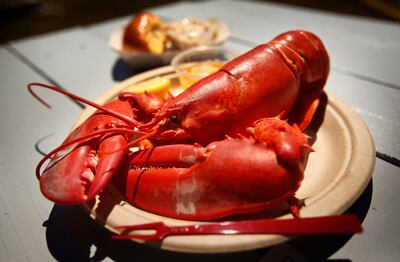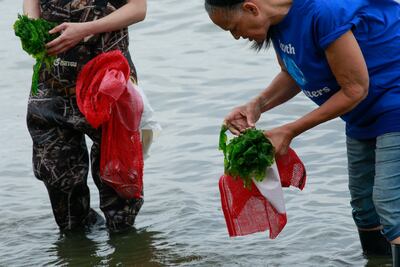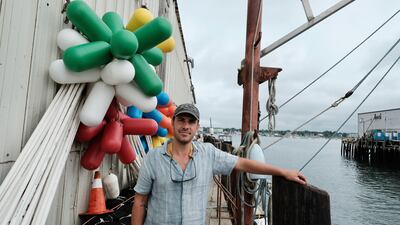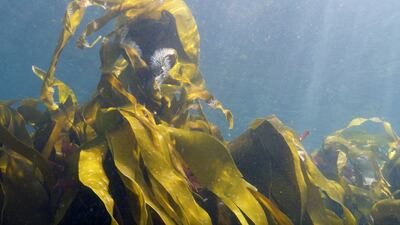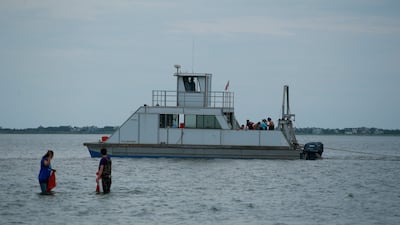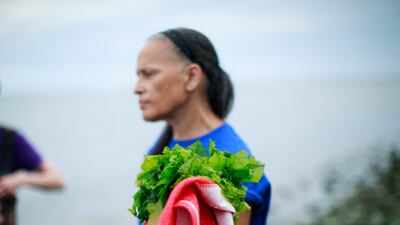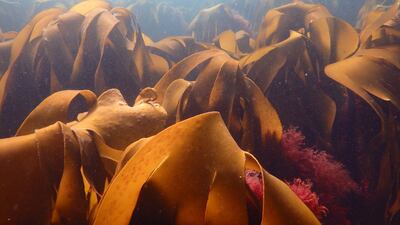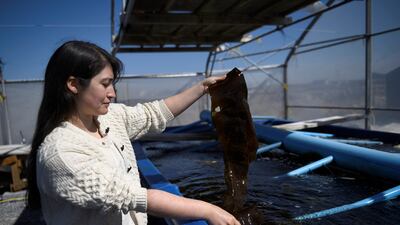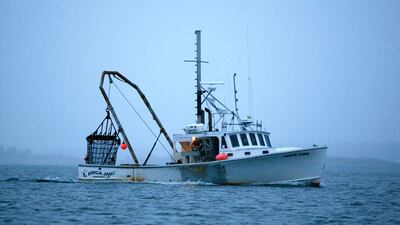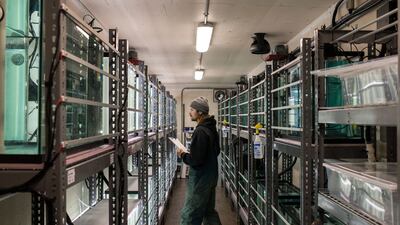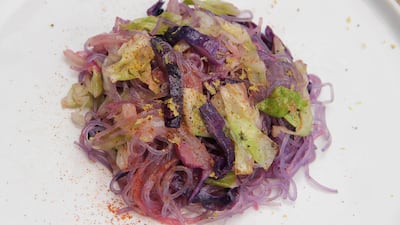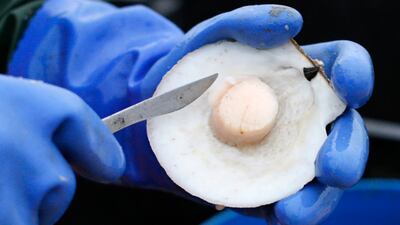Lobstermen and fishermen in the US state of Maine are looking to seaweed to future-proof their livelihoods against the impacts of climate change.
Aquaculture is growing exponentially in Maine as the fishing industry grapples with warming oceans affecting what has been the economic bedrock of the north-eastern US for centuries.
As global warming continues to wreak havoc on the world's oceans and as overfishing pushes some marine species to the brink of extinction, fishermen in Maine and elsewhere are having to find ways to supplement their income.
Kelp - a nutrient-rich variety of seaweed whose health benefits include vanadium, a mineral that is believed to help people manage diabetes - could just be their saving grace.
The problem
The Gulf of Maine is warming at 0.9°C a year, faster than 96 per cent of the world’s oceans.
The worst affected by this phenomenon are shrimp fishermen, whose industry, once worth $16 million a year, is in terminal decline as stocks plummet.
The warming of the ocean — which not only makes it harder for shrimp to spawn but also provides ideal conditions for their main predator, the longfin squid — has dealt a devastating blow to the industry.
There has not been a northern shrimp fishing season in the Gulf of Maine since 2013 and a moratorium was placed on the fishery after the population collapsed. Hopes that it could reopen were dashed after a recent survey showed that stocks were at their lowest level in four decades.
Now alarm bells are beginning to sound for the lobster industry, which brings in $725m a year and provides work to 4,000 lobstermen and another 35,000 people on the waterfront.
In the short term, the temperature rise has been good news for Maine, with more lobsters migrating north from Cape Cod, leading to an abundant supply in northern New England.
But in the long term, there is a major question mark over stocks, a study by the Gulf of Maine Research Institute said.
“In the Gulf of Maine, the lobster fishery is vulnerable to future temperature increases,” the study found.
“The researchers’ population projections suggest that lobster productivity will decrease as temperatures continue to warm, but continued conservation efforts can mitigate the impacts of future warming.”
Maine’s lobstermen are also facing curbs on the equipment they are allowed to use and where they can fish because of the threat to endangered right whales.
The green solution
Enter kelp, a plant that is both native to the area and a rising star on the health food scene.
“Eight years ago, we produced 50,000 pounds [about 22,700 kilograms] of kelp. Last year it was one million pounds [about 45,000kg],” said Sebastian Belle, executive director of the Maine Aquaculture Association.
“It’s a source of supplemental income for fishermen. They like to rotate, so they are not dependent on one fishery, but licences are becoming more difficult to come by.”
There are now more than 30 kelp farmers in Maine, of whom the overwhelming majority are former lobstermen.
“Fishermen have traditionally accessed other fisheries in addition to lobster, depending on the availability of different species,” Dr Kathy Mills, a research scientist at the institute, told The National.
“As we see some fisheries — such as northern shrimp — disappear with warming temperatures and associated ecosystem changes, fishermen are considering the potential of new opportunities, such as growing kelp, which might offset some of these impacts.”
And it is not only lobstermen who are turning to kelp.
Matthew Moretti, a marine scientist, started growing mussels in Casco Bay 20 years ago and added kelp to his business a decade ago.
His small business, operating on the Portland seafront, uses high-tech processing equipment imported from Europe.
“Recently, the kelp industry has grown significantly in Maine, but it's still quite tiny,” he said.
“The United States lags far behind the rest of the world.
“Farming the ocean is one of the most difficult endeavours you can really take on.”
The kelp calendar starts in the autumn, when seeded, 300-metre-long horizontal ropes are dropped into the Gulf of Maine and held in place by surface moorings leased from the state.
The plant is grown over the winter and harvested in the spring.
A farmer with about 4,000 metres of rope can earn as much as $57,000 from the crop, which is sold to Atlantic Sea Farms, the company that created America’s first commercially viable seaweed farm back in 2009.
Now run by an all-female team, it operates from a 2,500-square-metre processing facility in Biddeford, a few kilometres south of Portland.
Kelp farmers have done well, said Jesse Bains, the company’s marketing officer. A crop that was seen as a fallback is becoming hugely lucrative, with one farmer earning more than $100,000 a year from kelp.
“We want to make sure that people who work on the waterfront can diversify, whether it is mussel farmers or lobstermen,” Ms Bains added.
“Lobstermen are naturally good kelp farmers because they spend time on the ocean.
“As we all face down climate change and flail around wondering what to do, you have this community of lobstermen putting their heads down and getting to work.
“Kelp is a solution. It’s only in the last few years Maine has only had one species. The cod has gone, the shrimp has gone. It is an insurance policy.”
In global terms, the Maine kelp industry is something of a minnow, with 98 per cent of edible seaweed being grown in Asia.
But, according to Atlantic Sea Farms, the Asian product sold in the US is hardly in prime condition, arriving rehydrated or even dyed.
“We have several products we sell in grocery stores across the country,” Ms Bains said.
“There is seaweed salad, kraut and kimchi, which people can put on anything.
“We also make smoothie cubes out of kelp for the health benefits.
“The ultimate goal is to make it easy to eat at home.”
Our legal consultant
Name: Hassan Mohsen Elhais
Position: legal consultant with Al Rowaad Advocates and Legal Consultants.
MATCH INFO
Inter Milan v Juventus
Saturday, 10.45pm (UAE)
Watch the match on BeIN Sports
MATCH INFO
Wales 1 (Bale 45 3')
Croatia 1 (Vlasic 09')
Milestones on the road to union
1970
October 26: Bahrain withdraws from a proposal to create a federation of nine with the seven Trucial States and Qatar.
December: Ahmed Al Suwaidi visits New York to discuss potential UN membership.
1971
March 1: Alex Douglas Hume, Conservative foreign secretary confirms that Britain will leave the Gulf and “strongly supports” the creation of a Union of Arab Emirates.
July 12: Historic meeting at which Sheikh Zayed and Sheikh Rashid make a binding agreement to create what will become the UAE.
July 18: It is announced that the UAE will be formed from six emirates, with a proposed constitution signed. RAK is not yet part of the agreement.
August 6: The fifth anniversary of Sheikh Zayed becoming Ruler of Abu Dhabi, with official celebrations deferred until later in the year.
August 15: Bahrain becomes independent.
September 3: Qatar becomes independent.
November 23-25: Meeting with Sheikh Zayed and Sheikh Rashid and senior British officials to fix December 2 as date of creation of the UAE.
November 29: At 5.30pm Iranian forces seize the Greater and Lesser Tunbs by force.
November 30: Despite a power sharing agreement, Tehran takes full control of Abu Musa.
November 31: UK officials visit all six participating Emirates to formally end the Trucial States treaties
December 2: 11am, Dubai. New Supreme Council formally elects Sheikh Zayed as President. Treaty of Friendship signed with the UK. 11.30am. Flag raising ceremony at Union House and Al Manhal Palace in Abu Dhabi witnessed by Sheikh Khalifa, then Crown Prince of Abu Dhabi.
December 6: Arab League formally admits the UAE. The first British Ambassador presents his credentials to Sheikh Zayed.
December 9: UAE joins the United Nations.
The Perfect Couple
Starring: Nicole Kidman, Liev Schreiber, Jack Reynor
Creator: Jenna Lamia
Rating: 3/5
Test
Director: S Sashikanth
Cast: Nayanthara, Siddharth, Meera Jasmine, R Madhavan
Star rating: 2/5
The specs
Engine: 3.8-litre twin-turbo flat-six
Power: 650hp at 6,750rpm
Torque: 800Nm from 2,500-4,000rpm
Transmission: 8-speed dual-clutch auto
Fuel consumption: 11.12L/100km
Price: From Dh796,600
On sale: now
What can you do?
Document everything immediately; including dates, times, locations and witnesses
Seek professional advice from a legal expert
You can report an incident to HR or an immediate supervisor
You can use the Ministry of Human Resources and Emiratisation’s dedicated hotline
In criminal cases, you can contact the police for additional support
Recent winners
2002 Giselle Khoury (Colombia)
2004 Nathalie Nasralla (France)
2005 Catherine Abboud (Oceania)
2007 Grace Bijjani (Mexico)
2008 Carina El-Keddissi (Brazil)
2009 Sara Mansour (Brazil)
2010 Daniella Rahme (Australia)
2011 Maria Farah (Canada)
2012 Cynthia Moukarzel (Kuwait)
2013 Layla Yarak (Australia)
2014 Lia Saad (UAE)
2015 Cynthia Farah (Australia)
2016 Yosmely Massaad (Venezuela)
2017 Dima Safi (Ivory Coast)
2018 Rachel Younan (Australia)
Rashid & Rajab
Director: Mohammed Saeed Harib
Stars: Shadi Alfons, Marwan Abdullah, Doaa Mostafa Ragab
Two stars out of five
COMPANY%20PROFILE%20
%3Cp%3E%3Cstrong%3EName%3A%3C%2Fstrong%3E%20Haltia.ai%0D%3Cbr%3E%3Cstrong%3EStarted%3A%3C%2Fstrong%3E%202023%0D%3Cbr%3E%3Cstrong%3ECo-founders%3A%3C%2Fstrong%3E%20Arto%20Bendiken%20and%20Talal%20Thabet%0D%3Cbr%3E%3Cstrong%3EBased%3A%3C%2Fstrong%3E%20Dubai%2C%20UAE%0D%3Cbr%3E%3Cstrong%3EIndustry%3A%3C%2Fstrong%3E%20AI%0D%3Cbr%3E%3Cstrong%3ENumber%20of%20employees%3A%3C%2Fstrong%3E%2041%0D%3Cbr%3E%3Cstrong%3EFunding%3A%3C%2Fstrong%3E%20About%20%241.7%20million%0D%3Cbr%3E%3Cstrong%3EInvestors%3A%3C%2Fstrong%3E%20Self%2C%20family%20and%20friends%26nbsp%3B%3C%2Fp%3E%0A
SHAITTAN
%3Cp%3E%3Cstrong%3EDirector%3A%20%3C%2Fstrong%3EVikas%20Bahl%3Cbr%3E%3Cstrong%3EStarring%3A%20%3C%2Fstrong%3EAjay%20Devgn%2C%20R.%20Madhavan%2C%20Jyothika%2C%20Janaki%20Bodiwala%3Cbr%3E%3Cstrong%3ERating%3A%20%3C%2Fstrong%3E3%2F5%3C%2Fp%3E%0A
Two-step truce
The UN-brokered ceasefire deal for Hodeidah will be implemented in two stages, with the first to be completed before the New Year begins, according to the Arab Coalition supporting the Yemeni government.
By midnight on December 31, the Houthi rebels will have to withdraw from the ports of Hodeidah, Ras Issa and Al Saqef, coalition officials told The National.
The second stage will be the complete withdrawal of all pro-government forces and rebels from Hodeidah city, to be completed by midnight on January 7.
The process is to be overseen by a Redeployment Co-ordination Committee (RCC) comprising UN monitors and representatives of the government and the rebels.
The agreement also calls the deployment of UN-supervised neutral forces in the city and the establishment of humanitarian corridors to ensure distribution of aid across the country.
FIGHT CARD
1. Featherweight 66kg
Ben Lucas (AUS) v Ibrahim Kendil (EGY)
2. Lightweight 70kg
Mohammed Kareem Aljnan (SYR) v Alphonse Besala (CMR)
3. Welterweight 77kg
Marcos Costa (BRA) v Abdelhakim Wahid (MAR)
4. Lightweight 70kg
Omar Ramadan (EGY) v Abdimitalipov Atabek (KGZ)
5. Featherweight 66kg
Ahmed Al Darmaki (UAE) v Kagimu Kigga (UGA)
6. Catchweight 85kg
Ibrahim El Sawi (EGY) v Iuri Fraga (BRA)
7. Featherweight 66kg
Yousef Al Husani (UAE) v Mohamed Allam (EGY)
8. Catchweight 73kg
Mostafa Radi (PAL) v Abdipatta Abdizhali (KGZ)
9. Featherweight 66kg
Jaures Dea (CMR) v Andre Pinheiro (BRA)
10. Catchweight 90kg
Tarek Suleiman (SYR) v Juscelino Ferreira (BRA)
EMILY%20IN%20PARIS%3A%20SEASON%203
%3Cp%3ECreated%20by%3A%20Darren%20Star%3C%2Fp%3E%0A%3Cp%3EStarring%3A%20Lily%20Collins%2C%20Philippine%20Leroy-Beaulieu%2C%20Ashley%20Park%3C%2Fp%3E%0A%3Cp%3ERating%3A%202.75%2F5%3C%2Fp%3E%0A
Company Fact Box
Company name/date started: Abwaab Technologies / September 2019
Founders: Hamdi Tabbaa, co-founder and CEO. Hussein Alsarabi, co-founder and CTO
Based: Amman, Jordan
Sector: Education Technology
Size (employees/revenue): Total team size: 65. Full-time employees: 25. Revenue undisclosed
Stage: early-stage startup
Investors: Adam Tech Ventures, Endure Capital, Equitrust, the World Bank-backed Innovative Startups SMEs Fund, a London investment fund, a number of former and current executives from Uber and Netflix, among others.
Sholto Byrnes on Myanmar politics
